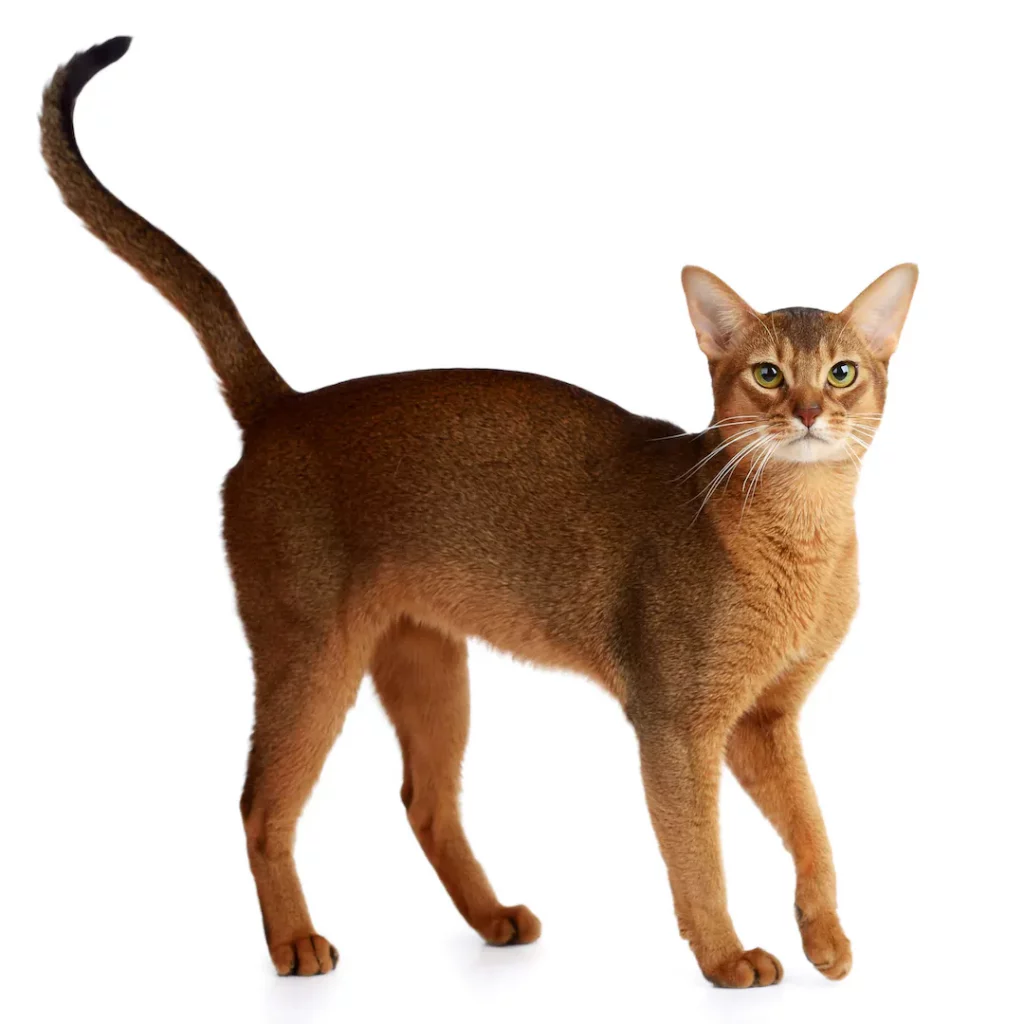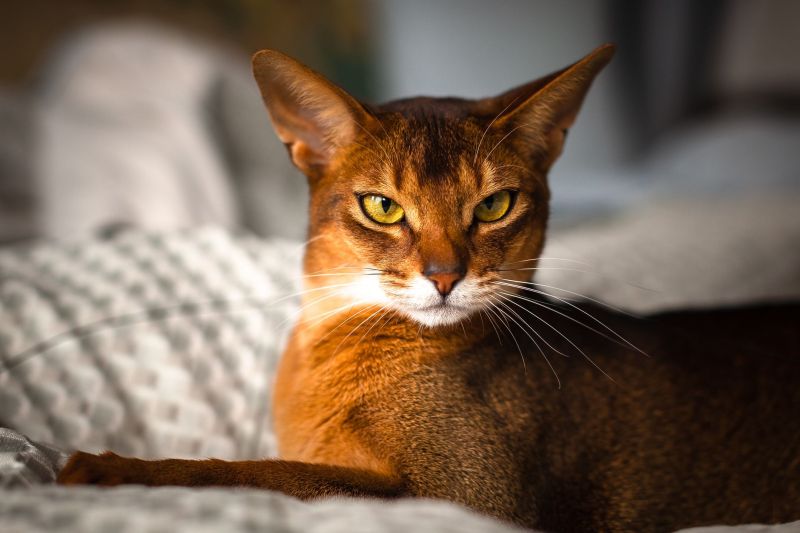
The Abyssinian, a small, short-haired cat with the ticked tabby coat, is fondly regarded as the clown of the feline kingdom. Exhibiting a playful personality and strangely dog-like intelligence, the Aby loves to show off and get attention.
Its name is derived from Abyssinia, now known as Ethiopia, in Africa. Allegedly, British Soldiers brought local kittens from North Africa in the nineteenth century, although there is no evidence to support this theory.
Abyssinians are well-known for their “chirping” vocalizations which don’t sound anything like a regular cat’s meow.
Price Tags for a Pet Abys
In North America, Abyssinians are governed by the Cat Fanciers’ Association (CFA) and the International Cat Association (TICA). There are a fair number of breeders in the USA, so finding a kitten will not be as difficult as it might be for other breeds.
For example, Aksum Abyssinians is a cattery located in Georgia and they currently have kitties for sale at a price range of $1,000 to $1,800 each, depending on the sex and color of the Aby. Females Abyssinians tend to cost more than males. The most sought after color for Abyssinians is cream.
To make a reservation, you must fill out a questionnaire and make a $250 non-refundable deposit. You’ll then be put on a waiting list.
If purchased successfully, you can bring your new Aby kitten home as soon as it reaches 12 weeks of age. For all new pets, the cattery provides first vaccinations, a microchip, health guarantee, registration papers, and a five-generation pedigree.
Spaying or neutering is provided free of charge. If you’d like the kitten to be delivered to a different state, transportation will cost about $350 for the East Coast and $550 for the West Coast.
OhMyCats is based in Oklahoma and their price for Abyssinian cats is about $800 for each kitten. However, only a certain number of litters are available each year, so there isn’t always a guaranteed that an Aby kitten is available.
TICA has a few other Abyssinian breeders listed in other states – feel free to contact them for more information regarding upcoming litters.
The cost to ship a cat domestically within 300 miles is about $120 to $250 with uShip.
Opting to rescue an adult Abyssinian from a shelter is a noble and more cost-effective alternative method for obtaining one of these clownish cats. Petfinder currently has more than 150 Abys listed for adoption in different states across the US.
Adoption fees are typically $200 at most. Including vaccinations, spaying or neutering, microchipping, and other health tests, you can save between $400 and $900 by choosing to adopt an Abyssinian instead of purchasing one from a breeder.
Raising Your Abyssinian Right
Abyssinians are certainly far more common than other cat breeds, but that doesn’t mean they should be loved any less! To raise your new kitten in the best possible way, you’ve got to think years in advance and budget for any and all costs that may arise.
- Food

The first thing that you will need to plan for is how much and what type of food your cat will be eating. Wet and dry food both have their advantages and disadvantages; kibble helps to keep your pet’s teeth strong and moist food helps to keep your cat well-hydrated.
Both of these are great benefits for your cat’s health, so you may want to consider giving them a bit of each type.
An excellent dry kibble for cats is Orijen’s Regional Red which costs about $35 for a 4-lb bag. The Turkey & Salmon Grain-Free Formula by Wellness is a delicious canned pate that also costs around $35 for a case of a dozen 12.5-oz cans.
The amount of food actually needed to feed an Abyssinian will depend mostly on its daily activities and age. In general, an 8-pound cat would need to eat daily about four-fifths of a cup of kibble or a 6-oz can of wet food. Split it between two to three meals throughout the day.
Abyssinians also tend to do well on a raw diet although some can be quite picky with their food. Wet and dry food can be fed to your cat either mixed together or in separate meals.
- Health Care
Cats, including Abyssinians, can experience all sorts of health issues throughout their lives such as vomiting, dehydration, urinary tract disease, and more. But Abyssinians, in particular, are prone to gingivitis and amyloidosis, the latter of which is a type of kidney disorder.
Unfortunately, scientists and veterinarians have not yet found a way to successfully treat amyloidosis, but the best way to combat it is to completely prevent it by making sure that your cat always takes its annual health and wellness exams.
To give you an idea of how much you can expect to spend, the cost of a vet exam at Mike’s Mobile Vet, which provides services to cats in Cincinnati and Kentucky, starts at $59 for the first visit. It also offers vaccinations and other services at the prices below:
- FVRCP – $20
- Leukemia – $25
- 1-Year Rabies Shots – $20
- 3-Year Rabies Shots – $30
- FeLV/FIV/HWT Test – $49
- Fecal Test – $21.50
- Transportation
When you first get your Abyssinian, you may need to transport it from the breeder to your home, and once your Abyssinian gets a little older, you may want to bring it along with you when traveling to another country or state. There are several important items needed in order to safely bring your kitty along when you travel.
Besides the obvious accessories such as food, water, leash, and perhaps a toy, you also need a cat carrier. And if you plan on traveling by plane then the carrier needs to be perfectly sized to ensure that it conforms to the size requirements of the airplane cabin and your airline of choice.
The exact dimensions that your carrier needs to be will depend on the airline policy, but it should be spacious enough to keep your cat comfortable and not restrict its movement by too much.
Having a carrier with extra pockets is a great way to store your cats stuff conveniently. If you have extra room, you may even have space for some of your own stuff that you want to bring on the plane during the flight.
Petsfit has a nice expandable travel carrier that comes with its own fleece mat and has plenty of storage space that costs about $40.
Your Abyssinian will also need a clean bill of health in order to travel. A health certificate will prove that your pet has had its latest vaccines (especially rabies), is disease-free, and is safe to be around other people and animals. Check the laws of the country you’ll be visiting to make sure that you have all of the vaccines that they need to get through customs without a hitch.
The cost of a health certificate at a clinic such as PetCareExpress in Houston, TX is around $40.
- Licensing
Although most cities only require dogs to be licensed and not cats, there are still some areas that have laws which mandate licenses along with rabies vaccinations. According to the folks over at P.D. Pitchford Companion Animal Village in Long Beach, California, municipal law requires all cats over four months old to have a 12-month license including a tag or microchip.
The annual cost of a cat license is only $10 in Long Beach, but the price greatly depends on the area. For example, cat licenses can cost as much as $60 per year in Miami.
Make sure you remember to allocate funds for renewing the cat license, if necessary, and make a note on your calendar reminding yourself to renew on time.
Guide to Caring for An Abyssinian
It’s a well-known fact that many cat breeds, especially the ones that were created based off of genetic mutations, are much more prone to diseases and health risks when compared to other pets such as dogs.
Abyssinians are no exception with their own fair share of ailments and thus need proper nurturing to give them the best shot at a long, happy, healthy life. Here’s a checklist for you to follow when taking care of your cat’s health:
- Have new cats screened for common diseases or request a certificate from the breeder.
- Never allow your Abyssinian to skip its annual physical exams.
- If you don’t plan on breeding, be a responsible pet owner and have your Aby spayed or neutered.
- Pay attention to the teeth and gums – Abys get gingivitis quite easily.
- If your cat prefers to eat dry food, make sure it drinks plenty of water to stay hydrated.
- Don’t overfeed your Abyssinian – obesity leads to many different health issues which can claim lives.
- Provide proper training so that your kitty knows where to potty.
